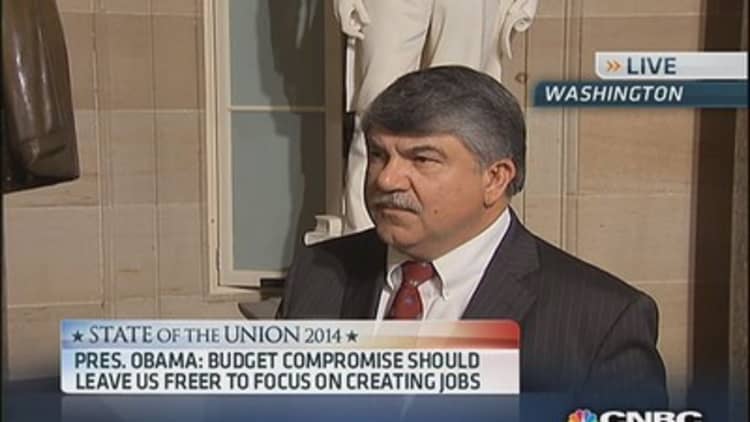After eight years of working for $9 an hour at the Pentagon Courtyard cafe, Jerome Hardy will likely get a raise. That's because President Obama is signing an executive order Wednesday raising the hourly minimum wage for federally contracted workers to $10.10.
"It's not a lot but, this will definitely help me out financially," said the 52-year-old Hardy, who works as a chef and lives with his parents near Capitol Hill.
"I live paycheck to paycheck, and It's been hard to survive on $9 an hour," he added. "I can't even afford to take a vacation. which I haven't had since I started here."
Another worker to eventually benefit is 19-year-old Alexis Vasquez, who makes $8.25 an hour working one day a week at a McDonald's at the Air and Space Museum.
"This is what we went on strike for last year," said Vasquez, who also works at a Pizza Hut in another part of Washington to make ends meet.
(Read more: Obama to sign order on federal minimum wage hike Wednesday)
The executive order to raise the minimum pay from $7.25 an hour will affect workers starting next January, and applies to new contracts and replacements for expiring contracts. It may take a while for Vasquez and Hardy to see their raises since they are both under existing contracts.
Median hourly wages for the top 10 lower-wage occupations
| 2012 median <br>hourly wage | Percentage change <br>in real median <br>hourly wage,<br>2009-2012 | |
|---|---|---|
| 1 Retail salespersons | $10.15 | -2.60% |
| 2 Cashiers | $9.12 | -0.50% |
| 3 Combined food preparation & serving workers, Including fast food | $8.78 | -0.90% |
| 4 Waiters and waitresses | $8.92 | -2.10% |
| 5 Stock clerks and order fillers | $10.60 | -1.70% |
| 6 Restaurant cooks | $10.59 | -7.10% |
| 7 Personal care aides | $9.57 | -5.50% |
| 8 Maids and housekeeping cleaners | $9.41 | -5.00% |
| 9 Home health aides | $10.01 | -5.00% |
| 10 Food preparation workers | $9.28 | -5.20% |
Source: Source: NELP Analysis of Occupational Employment Statistics
The issue of raising the minimum wage remains contentious. Business groups including the Chamber of Commerce and the National Restaurant Association are strong opponents of any mandatory minimum wage rules, saying they will hurt a still-struggling economy by stopping businesses from hiring.
"I think there's a feeling that if we wave a magic wand and raise wages, we will have more money and spend it, but that's not the case," said Tim Nash, a professor of economics at Northwood University. "Businesses can't afford to pay higher prices for labor. They still have a lack of confidence in the economy."
(Read more: Minimum wage debate insane, says 'Mr. Wonderful')
But advocates for a higher minimum wage see it differently.
"After two decades of research, there's little to support the contention that raising the minimum wage hurts the economy," said Arun Ivatury, campaign strategist for the National Employment Law Project. "If you give workers more money, they will spend it and create more jobs, not cut them back."
Some business owners see a minimum wage hike as simply the right thing to do.
"If a company is getting a contract paid for by federal taxpayer dollars, it makes perfect sense that they pay a $10.10 minimum wage. Fair wages are part of the formula for success at my company," said Jon Cooper, president of Spectronics a manufacturer of ultraviolet equipment which has sold products to the U.S. military and NASA.
Wage hikes across country
In his State of the Union speech last month, Obama said he would sign an executive order on federal workers, adding that he was prepared to take the action to circumvent a Congress that has been inactive on the issue.

An estimated 2 million Americans work on federal contracts, but the number of workers receiving the minimum wage would be a small part of that.
According to the White House, several occupations that will be helped by the move include kitchen and laundry workers on military bases, as well as janitors at federal buildings and construction workers at government building sites.
A survey by the National Employment Law Project of contractors who manufacture military uniforms, provide food and janitorial services and truck goods found that 75 percent of them earn less than $10 per hour. One in five was dependent on Medicaid for health care, and 14 percent used food stamps.
Still more to do
For Hardy and Vasquez, the fight for getting what they say are living wages has been hard.
"I'm supporting my father, who lost his job as a parking valet last July, and my younger sister who's still in high school," said Vasquez, who had been saving money to go to college to study architecture. "I'd like someone to try living on $8.25 an hour and see how that feels."
"I can't take a sick day because I will lose money," said Hardy. "I have no benefits on top of the low pay."
Both men say they will be at the White House when Obama signs the order on Wednesday. And they say they will continue to push for higher wages.
"This is just the beginning," said Hardy. "I will keep fighting for others as well as myself."
"We have to keep pushing for better wages," added Vasquez. "The fight is not over even with today's signing."
—By CNBC's Mark Koba. Follow him on Twitter @MarkKobaCNBC..


